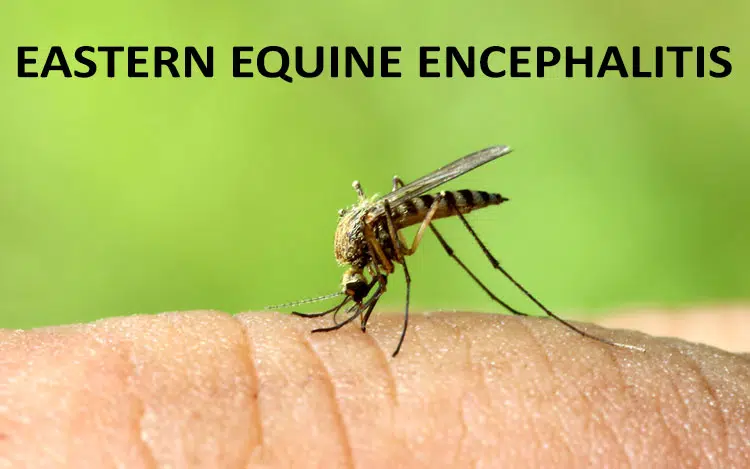LANSING, MI (WKZO AM/FM) – State health officials are beginning aerial treatments as Eastern Equine Encephalitis becomes a bigger concern in parts of Michigan.
— Latest EEE Case Count —
As of September 13th the rare mosquito-borne disease has been confirmed in 22 horses in 10 counties in Michigan, which is twice as many animal cases as this time last year. No human cases have been reported so far this year but more animal cases are being investigated.
“We know the mosquito is active and humans are at risk of getting the disease as well. It is incredibly important that we act quickly with all the public health tools we have to prevent the spread of the disease in the state,” MDHHS Chief Medical Executive Dr. Joneigh Khaldun said during a press call on Monday.
Last year, 10 people in Michigan contracted EEE and six southwest Michigan residents died.
— EEE Aerial Treatment Counties and Product Details —
Because of this, the Michigan Department of Health and Human Services is scheduling treatment for the 10 impacted counties including, Barry, Clare, Ionia, Isabella, Jackson, Kent, Mecosta, Montcalm, Newaygo and Oakland. More counties could be selected for treatment if any human or new animal EEE cases occur.
Treatment is scheduled to begin the evening of Wednesday, September 16th and last for about three to five days, weather dependent. The treatment area plan will be available at Michigan.gov/EEE. Aerial treatment takes place in the nighttime hours when mosquitoes are more active, when fish are less likely feeding at the surface, and when honeybees are in their hives.
State-certified mosquito control professionals in a specialized aircraft will apply an approved pesticide, known as Merus 3.0, as an ultra-low volume spray to kill adult mosquitoes on contact. These droplets are smaller than the head of a pin and only about a tablespoon of product will be applied per acre.
Merus 3.0 contains 5% pyrethrins, which is a botanical insecticide extracted from chrysanthemum flowers and commonly used to control mosquitoes, fleas and other pests. This treatment was the same product that was used during the aerial treatments in 2019.
— Health Concerns —
Officials say that there are no health risks connected to aerial spraying and no special precautions are recommended, but they do say that anyone who has known sensitivities to pyrethrins should stay indoors during treatment.
According to the press release, more than 557,000 acres in Michigan were treated with Merus 3.0 in 2019 and they found no increased human, animal or insect adverse effects associated with aerial treatment.
Still, MDHHS recommends that residents in the treatment areas should cover small ornamental fishponds during the night of spraying and concerned pet owners can bring their animals in, although it is not necessary.
— What is EEE? —
According to MDHHS, “EEE is one of the most dangerous mosquito-borne diseases in the United States, with a 33 percent fatality rate in people who become ill. People can be infected with EEE from one bite of a mosquito carrying the virus. Persons younger than age 15 and over age 50 are at greatest risk of severe disease following infection. More than 25 percent of the nation’s EEE cases last year were diagnosed in Michigan.”
— EEE Symptoms —
Signs a person may have this mosquito-borne disease include the sudden onset of fever, chills, body and joint aches which can progress to a severe encephalitis, resulting in headache, disorientation, tremors, seizures and paralysis.
Anyone experiencing these symptoms should contact their medial provider immediately.
— Opting Out —
Although Kalamazoo County is currently not part of the aerial treatment area, last year the city of Kalamazoo and Portage opted out of the spraying through residents submitting requests that it does not take place. This year, counties will not have the option to opt-out of the mosquito-control treatment.
“As recent history has shown us, EEE can strike fast and it can be deadly to humans and animals,” said MDARD Director Gary McDowell in a statement. “MDARD fully supports the work and commitment of MDHHS to protect public health, which is why we have removed an obstacle that might have prevented them from taking action quickly.”
— EEE Precautions —
MDHHS is providing a list of tips on how Michanders can prevent mosquito bites and the potential of EEE:
- Avoid being outdoors from dusk to dawn when mosquitoes carrying the EEE virus are most active.
- Applying insect repellents containing the active ingredient DEET, or other U.S. Environmental Protection Agency-approved product to exposed skin or clothing, and always follow the manufacturer’s directions for use.
- Wearing long-sleeved shirts and long pants when outdoors. Apply insect repellent to clothing to help prevent bites.
- Maintaining window and door screening to help keep mosquitoes outside.
- Emptying water from mosquito breeding sites around the home, such as buckets, unused kiddie pools, old tires or similar sites where mosquitoes may lay eggs.
- Using nets and/or fans over outdoor eating areas.
— More Information —
Residents with more questions can go to Michigan.gov/EEE or call the MDHHS hotline at 1-888-535-6136. The hotline is open from 8 a.m. to 5 p.m. Monday through Friday.




Comments